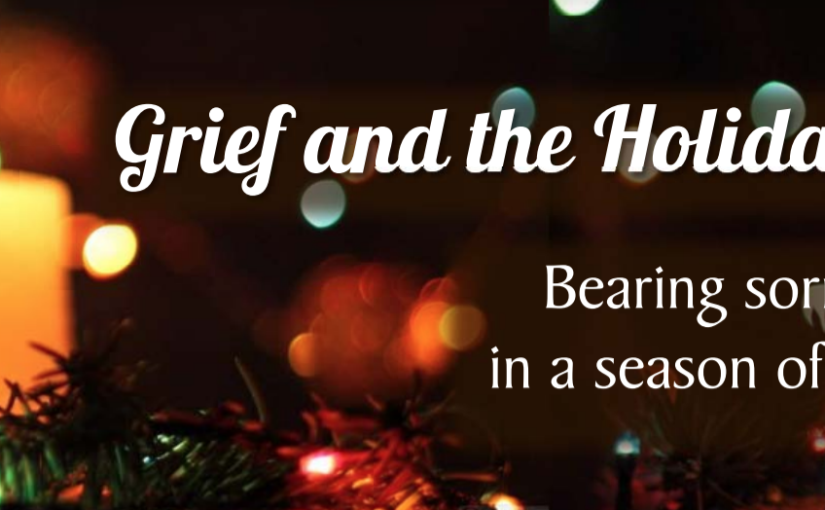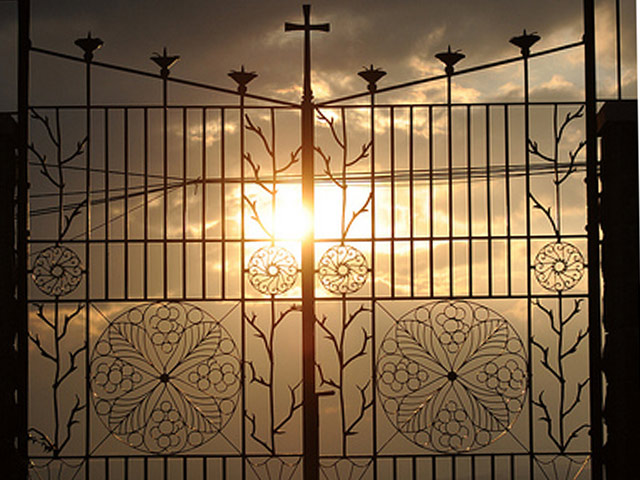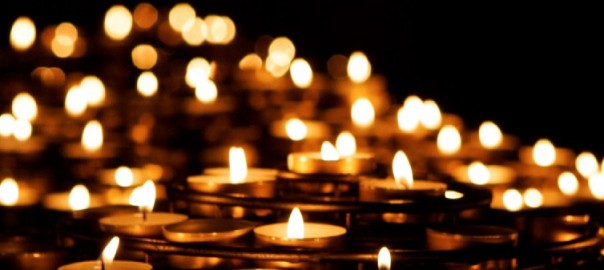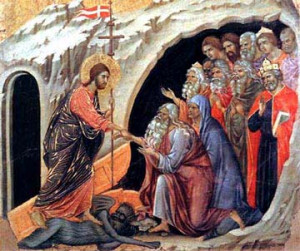Today, I was invited to give a talk at one of the local funeral homes for their clients who had lost loved ones during the last year. I spoke about grieving during the holiday season.
A reading from the book of Revelation (22:12-14, 16-17, 20-21).
“Behold, I am coming soon. I bring with me the recompense I will give to each according to his deeds. I am the Alpha and the Omega, the first and the last, the beginning and the end.” Blessed are they who wash their robes so as to have the right to the tree of life and enter the city through its gates.
“I, Jesus, sent my angel to give you this testimony for the churches. I am the root and offspring of David, the bright morning star.” The Spirit and the bride say, “Come.” Let the hearer say, “Come.” Let the one who thirsts come forward, and the one who wants it receive the gift of life-giving water.
The one who gives this testimony says, “Yes, I am coming soon.” Amen! Come, Lord Jesus! The grace of the Lord Jesus be with all.
Many years ago now, in the young adult period of my life, my grandmother on my father’s side passed away after a long and heartbreaking illness. She was one of my best friends: we would sit and talk for hours about the “Old Country” and so many things. After she died, I was in a local store around this time of year, and the store was all decked out in a homey, holiday theme. I had gone in there just to see if I could find a gift for my mom, and I was in there maybe thirty second and found I couldn’t take it and rushed out and broke down and cried. I was overcome by a sense of grief that came at me out of nowhere, and realized that I still had a long way to go in the grieving process.
I’m glad to be here with you tonight, and I look forward to sharing about my own experience of grieving and to share some thoughts about how grief works. But I do want to start out by saying that I may or may not have any idea how you feel. Grief is a rather personal thing, by which I mean that each person experiences grieving in their own way. It has to do with who they are grieving, what their relationship with that person was like, and how long it’s been since the loss of that person took place. But I do want to be clear about the fact that we all grieve our loved ones – whether our relationship with them was good or bad, no matter how strong or weak we are emotionally otherwise, and no matter how long it’s been since their passing. Grief is a common human experience, which is part and parcel of the life of loving.
One of my deepest griefs came in the death of my father. He has been gone ten years now, but it seems like I find a reason to miss him all the time. Often on the anniversary of his death, I will gather with Mom, my sister Sharon, and my Aunt Eileen (dad’s sister), and sometimes my sister Peggy and the kids, to celebrate Mass and visit the cemetery to pray and lay some flowers, and then go out to eat. That’s a pretty good picture of how grief works in our family, and always has. We remember those we love, we pray, we visit the cemetery, and we celebrate them at some kind of meal, talking about them and remembering who they were for us.
Several years ago, not long after he died, I took a road trip. I packed up early on Sunday and was out of the house by 6am, and took a 3 hour and 45 minute drive to see a friend, one of my classmates from seminary, who was a priest in the diocese of Springfield. I visited with him all of Sunday and on Monday morning, then packed up just before noon and returned home.
I mention this because the trip itself was a bit unusual for me. Usually, I’ll play the radio in the car the whole way down, but for most of the trip that time, I traveled in silence. I did that because I was aware that I was missing my dad in a particular way. I think I was missing him on this trip because Dad was great for road trips. He’d get up before the crack of dawn, which is what I did, and he’d motor on toward whatever our destination was. He loved to drive even long distances, and especially when I was a kid, the trip was kind of filled with expectation. It wasn’t always fun getting up so early to leave, but it was kind of cool because it was a different experience, and as a kid, who could sleep the night before vacation anyway?
So many wonderful things continue to remind me of Dad. I was sitting on the deck at Mom’s house a couple of weeks ago. We had intended Dad to sit out and enjoy the deck that summer, but he died just a few days before it could be completed. He would have loved it; he always liked sitting outside and enjoying the neighborhood and his house. So as I sat there on that deck and prayed my breviary, I found myself especially close to Dad.
Whenever I was staying at Mom and Dad’s house overnight, and I’d get up in the morning to go shower, I would pass by his room and he would still be in bed. But he’d be awake, and would always say “good morning.” I miss those “good mornings” now.
A year or so after the deck got built, Mom and I were out staining it. When we were getting started, I was searching the garage for some painting supplies. When I got frustrated and couldn’t find what I was looking for, I said “okay Dad, where did you put it?” And the next drawer I opened had all the things I needed, right where he left them. I couldn’t help but smile and say “thanks” because Dad was the only one who knew where anything was in that garage. Not that it was messy; it was very organized, but he alone knew the scheme!
As I’ve experienced these things in the years since he died, I’ve been aware of my sense of loss that doesn’t ever seem to completely go away. In some ways, that’s a good thing, because it reminds me how much I have loved and how much I was loved. And through all of it, I have felt the abiding presence of God who is with us in all of our joys, and all of our sorrows. I really feel like the danger of grieving is so miniscule compared with the danger of never having loved in our lives.
I come at grief from a couple of perspectives. I’m Irish on dad’s side and Italian on mom’s side. So the hands down winner for grieving is the Italian side of me. I have relatives who have been known to throw themselves on the casket at a cemetery service, and there is generally a lot of outward grieving going on. The Irish side of me makes all the arrangements, does what needs to be done, then never speaks of it again. That’s a generalization, of course, but there’s some truth to all of it.
I had the opportunity to experience grieving at a fairly young age: I was just about nine years old. Then my grandfather, Mom’s Dad, was close to death. Mom and Dad talked with me about what was going to happen, and we all cried and hugged, and I began the strange feeling of grief when I was just nine years old. When the time came, as is the custom on both sides of our family, all of us went to the wake and funeral, little as we were.
Some people try to shield their children from that experience. Indeed, our overly medicated society tries to protect us all from that experience of grief, white-washing it and moving on just as soon as possible. But how grateful I am that my parents didn’t do that to me, because grieving is a healthy experience in life. Through that experience, I learned to love more deeply, not less. I learned that the people in my life are signs to me of God’s love and presence in my life. I learned that grieving is part of life, that it’s natural, that it’s something we all experience, that it’s a sign of God’s love. We have to learn to grieve, as soon as we have the opportunity, and not to be afraid of it, because grieving is a way that we remember and love and heal and grow.
Sometimes for my yearly retreat, I will take it at Mundelein Seminary, where I went to school. I will stay there, and spend some time reading and praying and recharging myself. One of the things I always try to do every day when I am there is to take a walk around the grounds, which are really beautiful. One day on my walk around the lake there, I came across an icon of Our Lady of Sorrows that had been recently erected. It marked the spot where, in the fall of my last year in seminary, four of my brother seminarians were involved in a horrible, alcohol-related accident. The two back-seat passengers were thrown from the car, and died. The seminary isn’t like a big state university, it’s a small school of about 230 students, so you can imagine the impact on that small group of men.
The day it happened was, ironically, or perhaps by design, the feast of Our Lady of Sorrows. The priest who presided at Mass that day had written his homily the night before, and spoke of Our Lady’s experience of grieving the loss of her Son Jesus. He never changed a word of it, and of course it resonated with all of us on that day in a way it couldn’t ever have resonated on any other day. I’ve never seen a room full of hundreds of men in tears except on that day, and let me tell you, it was striking.
The reason I bring this story up is that it is a good example to me of Christian grieving. The icon was erected a year or so after I left the seminary, and I think it was a good way to remember Matty and Jared. The community marked the spot where the horrible thing had taken place, consecrated the memory of those good men who had done something stupid to God who makes beauty out of the worst things possible, and commended the whole of it to the saints – in this case in the person of Our Lady of Sorrows.
We believe in the Communion of Saints, which is that wonderful “cloud of witnesses” that we hear about in the Scriptures. In the Letter to the Hebrews (12:1), we hear this: “Therefore, since we are surrounded by so great a cloud of witnesses, let us rid ourselves of every burden and sin that clings to us and persevere in running the race that lies before us.” This cloud of witnesses, this Communion of Saints consists of all the saints that we always know about: the men and women throughout history that have been formally and canonically recognized as saints. We believe that these people are definitely in heaven, and have the power to intercede for us through their fervent prayers.
The Communion of Saints also includes, however, those men and women who have never been formally recognized as saints. They are our loved ones, good and holy people for the most part, who have helped us to see God in this life. They too can intercede for us to God. They may or may not be in heaven at this time, but are most likely headed there in any event. They may still need to undergo the merciful purification that we call Purgatory for a time, but nonetheless, they have been on the whole witnesses of faith for us.
So as I stood there looking at the image of Our Lady of Sorrows, I thought about the Saints, especially the Blessed Virgin, and I thought about the saints, including Matty and Jared, and I prayed for those “small-s” saints with the Memorare, a prayer that I remembered was one of Matty’s favorites:
Remember, O most gracious Virgin Mary, that never was it known that anyone who fled to thy protection, implored thy help, or sought thine intercession was left unaided.
Inspired by this confidence, I fly unto thee, O Virgin of virgins, my mother; to thee do I come, before thee I stand, sinful and sorrowful. O Mother of the Word Incarnate, despise not my petitions, but in thy mercy hear and answer me.
Amen.
The Church helps us through our grieving. In the Liturgy, we pray what we believe. And what we believe about grief is that it’s normal, that it’s part of life, that it’s a response to the gift of life that we have been given. We are a people who believe that there is hope in the midst of sorrow, joy in the midst of pain, resurrection that follows death, and love that survives the grave and leads us to the one who made us for himself.
In the Liturgy, the words of hope that we find lead us back to the Cross and Resurrection. Death is not the end. Love does not come to an end at the grave. Our loved ones who have been people of faith have been made new by passing through the gates of death. Their happiness is our hope; the grace and blessing that they now share will one day be ours.
But I will acknowledge that even that glimmer of hope doesn’t erase all the pain. We are left with tears and loneliness, and that empty place at the table. But sadness and pain absolutely do not last forever, because death and sin have been ultimately defeated by the blood of Christ. We can hope in the day that our hearts will be healed, and we will be reunited with our loved ones forever, in the kingdom that knows no end.
Perhaps sometimes it feels like it would have been better not to have loved at all, because then maybe the pain wouldn’t be so great. But deep down in our hearts, we have to know that’s not true. Sadness and pain are temporary. Love is eternal. As the Church’s Vigil for the Deceased tells us, “all the ties of friendship and affection which knit us as one throughout our lives do not unravel with death.” We know that death only separates us for a short time, and even though there is a hole in our heart, the sadness that we feel is way better than never having loved at all, never having had our loved ones in our lives at all.
Grief and loss can do a number of things to us, and that is what makes it so scary. Some people can become fixated in their grief and can be taken by a kind of clinical depression. For that, we must count on the expert assistance of counselors and therapists who can help us through the root causes of depression and help us to experience our grief in healthier ways. But that doesn’t mean that everyone who experiences loss should be medicated or is even ill. If you’re moving through grief and continue to be aware of the gifts of your relationship with those you have lost, and continue to know that God is present with you even in your pain, then you’re probably grieving in healthy ways. But if you’re lost and have lost sight of God’s love, then you might need to speak with someone about your grief.
Jesus said in the Beatitudes “blessed are those who mourn, for they shall be comforted.” What makes this a particularly outrageous statement is that in biblical language, the word “blessed” here means “happy.” So how is it that mourners are actually happy? And the answer to that is that mourners have the wonderful experience of God’s presence in their grief. When we grieve, we are especially close to God, close to our God who grieves when we are hurt, who may allow the bad things that happen in our lives, but never wills them, whose heart breaks whenever we sin and turn away from him. We are made in the image and likeness of our God who is no stranger to grief, especially in the person of Jesus Christ, who grieved at the death of his friend Lazarus, who grieved with those he ministered to, and whose heart was broken when he saw the sadness of his mother at the foot of the cross. Our God accepts grief head-on, and so should we, aware that in our grieving we are closer to God than ever, and have the benefit of his abiding presence in our pain.
The pain doesn’t just go away. There is no time when grief is “over.” I miss Dad in many ways, all the time. I miss my grandparents, and an aunt and uncle who have gone to their rest. You miss your loved ones in much the same way. There are times when our grief overwhelms us, comes at us out of nowhere. But many are the times when our memories provide us healing and joy.
Especially as we prepare for Christmas, we mourn perhaps more intensely. It’s hard to be joyful, to see the joy of the world around us, when we are still grieving. It’s hard to acknowledge that for others, life just goes on. Although, I have to say that a lot of the so-called happy people out there might just have a happy face pasted on them, because grief is so universal, and almost universally done poorly! But Advent reminds us that there is hope. This is a reading from the book of the Prophet Isaiah (25:6-9):
On this mountain the LORD of hosts
will provide for all peoples
A feast of rich food and choice wines,
juicy, rich food and pure, choice wines.
On this mountain he will destroy
the veil that veils all peoples,
The web that is woven over all nations.
He will destroy death forever.
The Lord GOD will wipe away
the tears from all faces;
The reproach of his people he will remove
from the whole earth; for the LORD has spoken.
On that day it will be said:
“Indeed, this is our God; we looked to him, and he saved us!
This is the LORD to whom we looked;
let us rejoice and be glad that he has saved us!”
Advent reminds us God didn’t give up on a world steeped in sin and ruled by death. Instead, he burst into our time and place with life: taking our lowly and flawed human flesh, and redeeming it, making it holy, that we would be saved and God would be glorified. For those of us who mourn during the holiday season, the promise of Advent tells us that sadness isn’t our enduring reality, that love conquers everything, and that God has life in mind for all of us, in that kingdom where we all hope to arrive at life eternal. That’s a hope that is so much stronger than any sadness we may experience.
When he was little, my nephew had a very close relationship with Dad, who he called “Boppy.” In the days after Dad’s death, Danny often dreamed of Dad and said to his mom, my sister, a year or so after Dad’s death, “I’m sad because I didn’t dream of Boppy last night. I like to dream about Boppy.” Our dreams, our memories are gifts from our God who insists that we always know that we are loved. Sometimes it hurts, but ultimately it heals. Sadness is temporary. Love is eternal.





 When I celebrated this Liturgy last year, the homily I gave was pretty straightforward. It was theologically accurate and liturgically sound. This year, the experience is a little different for me, and so will the homily be different. Many of you know that this past May, my Dad died, and the experience of grieving his loss has helped me to personalize my theology and my pastoral care, and my preaching. Today I hope you don't mind if I reminisce a bit about my Dad, because I do it so that perhaps it may touch something in you to help you in your grieving and give you hope in your sorrows.
When I celebrated this Liturgy last year, the homily I gave was pretty straightforward. It was theologically accurate and liturgically sound. This year, the experience is a little different for me, and so will the homily be different. Many of you know that this past May, my Dad died, and the experience of grieving his loss has helped me to personalize my theology and my pastoral care, and my preaching. Today I hope you don't mind if I reminisce a bit about my Dad, because I do it so that perhaps it may touch something in you to help you in your grieving and give you hope in your sorrows.
You must be logged in to post a comment.